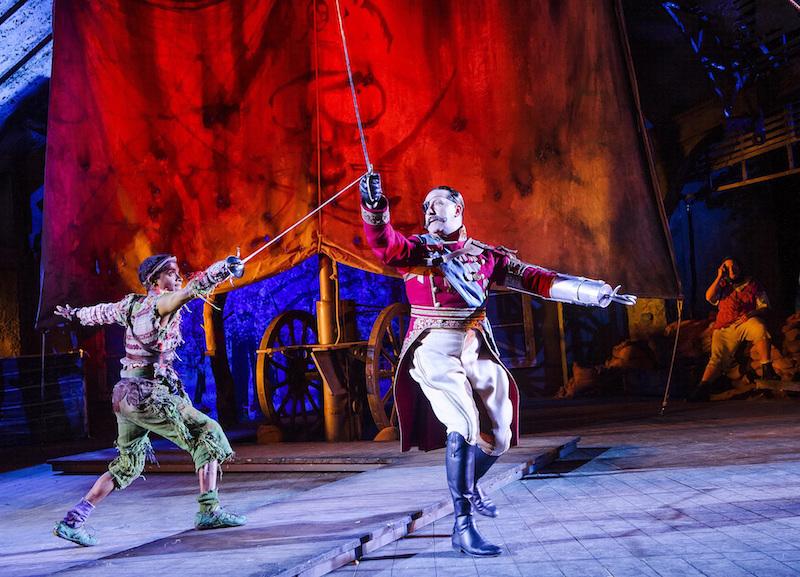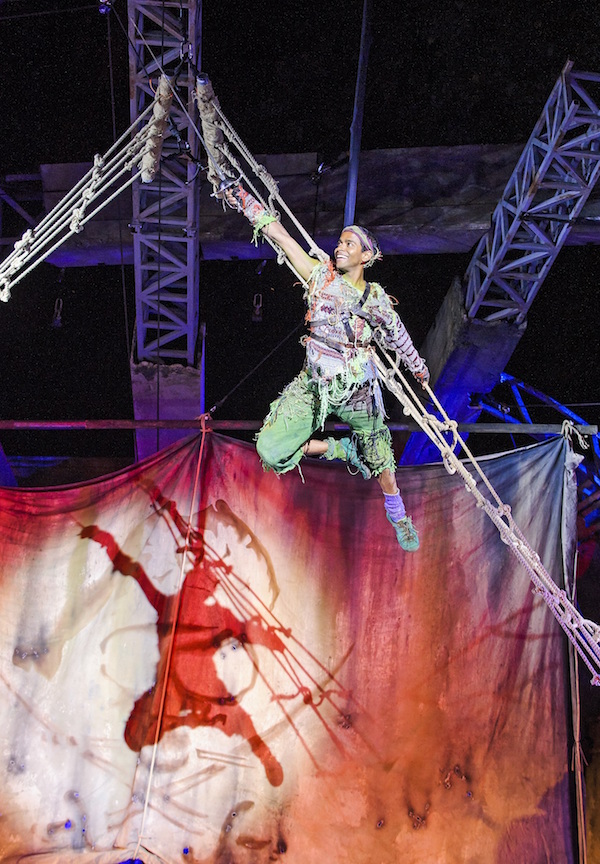Peter Pan, Regent's Park Open Air Theatre | reviews, news & interviews
Peter Pan, Regent's Park Open Air Theatre
Peter Pan, Regent's Park Open Air Theatre
Eloquent wartime reimagining of Barrie's play is a magical experience

“All children, except one, grow up.” So begins J. M. Barrie’s iconic tale of arrested development, given new power and poignancy in this high-flying production. A century after one of Barrie’s youthful collaborators, George Llewelyn Davies, was killed at Ypres, it tells their familiar story through the prism of the brutalising First World War, in which context Peter’s neverending youth becomes an escapist beacon.
Timothy Sheader and Liam Steel’s rich reimagining opens with wounded soldiers, far from home, tended by reassuringly maternal nurses – there are enough mother issues in Barrie’s play to fuel a decade-long Freud symposium. Kae Alexander’s nurse distracts her charges with Peter Pan, and the eponymous character (Hiran Abeysekera, pictured below) materialises, drawn by Mrs Darling’s similar recitation of fairy tales. As we shift fluidly into fantasy, Alexander becomes Wendy, another natural carer, who, with brothers John (Patrick Osbourne) and Michael (Thomas Dennis), flies away to Never Land.
 There’s a well-struck balance between riveting action – notably an epic battle – and indication of make-believe. In Jon Bauser’s textured design, beds become grassy hills, a house, an ever-shrinking rock in the lagoon; the children playact adult roles; and the vanquished rise from the dead, only their pride hurt. Captain Hook’s (David Birrell) motley crew raid the dressing-up box, offering everything from ninja and Roman centurion to medieval crusader. The costuming also evokes the perpetual cycle of conflict, finishing with Birrell’s crisply callous First World War general, sacrificing lives for personal glory.
There’s a well-struck balance between riveting action – notably an epic battle – and indication of make-believe. In Jon Bauser’s textured design, beds become grassy hills, a house, an ever-shrinking rock in the lagoon; the children playact adult roles; and the vanquished rise from the dead, only their pride hurt. Captain Hook’s (David Birrell) motley crew raid the dressing-up box, offering everything from ninja and Roman centurion to medieval crusader. The costuming also evokes the perpetual cycle of conflict, finishing with Birrell’s crisply callous First World War general, sacrificing lives for personal glory.
The Great War pervades Never Land, from judicious period musical choices to army props and the elegant paralleling of Mrs Darling waiting for her children and soldiers’ families awaiting their return from the Front; both experience re-entry problems. The innocence of the lovably puppyish Lost Boys’ war games is lost, and the clarity of honour decimated. Some of this is elucidated in heavy-handed fashion – unnecessary given the theatrical articulacy on display.
Abeysekera’s Peter is a cocky but winning street kid, his sinuous flight an organic extension of magnetic expressiveness; when Wendy kisses him, he levitates with joy. Spine-tingling lift-off is achieved via bungee ropes and the support and counterbalancing of ever-present soldiers, who advance the action with military precision. Rachael Canning’s marvellous Steampunk puppets evoke the creatures: the crocodile a snapping ladder; vicious mermaids gas masks and sheet metal; and Rachel Donovan’s indelible Tinker Bell a battered Pixar lamp with the hissing voice of Gollum, jealously guarding her precious. Alexander’s impassioned Wendy puts up a good fight, her gutsiness making the outdated gender politics more palatable. Other standouts include Beverley Rudd’s big-hearted Smee and Osbourne’s John, determined to die like an English gentleman.
Eternally resonant is the transitoriness of uncomplicated childhood; beware the crocodile’s ticking clock. As night falls in the park, our primal response to this eloquently and magically translated bedtime story deepens. I do believe in fairies!
rating
Explore topics
Share this article
The future of Arts Journalism
You can stop theartsdesk.com closing!
We urgently need financing to survive. Our fundraising drive has thus far raised £49,000 but we need to reach £100,000 or we will be forced to close. Please contribute here: https://gofund.me/c3f6033d
And if you can forward this information to anyone who might assist, we’d be grateful.

Subscribe to theartsdesk.com
Thank you for continuing to read our work on theartsdesk.com. For unlimited access to every article in its entirety, including our archive of more than 15,000 pieces, we're asking for £5 per month or £40 per year. We feel it's a very good deal, and hope you do too.
To take a subscription now simply click here.
And if you're looking for that extra gift for a friend or family member, why not treat them to a theartsdesk.com gift subscription?
more Theatre
 Hamlet, National Theatre review - turning tragedy to comedy is no joke
Hiran Abeyeskera’s childlike prince falls flat in a mixed production
Hamlet, National Theatre review - turning tragedy to comedy is no joke
Hiran Abeyeskera’s childlike prince falls flat in a mixed production
 Rohtko, Barbican review - postmodern meditation on fake and authentic art is less than the sum of its parts
Łukasz Twarkowski's production dazzles without illuminating
Rohtko, Barbican review - postmodern meditation on fake and authentic art is less than the sum of its parts
Łukasz Twarkowski's production dazzles without illuminating
 Lee, Park Theatre review - Lee Krasner looks back on her life as an artist
Informative and interesting, the play's format limits its potential
Lee, Park Theatre review - Lee Krasner looks back on her life as an artist
Informative and interesting, the play's format limits its potential
 Measure for Measure, RSC, Stratford review - 'problem play' has no problem with relevance
Shakespeare, in this adaptation, is at his most perceptive
Measure for Measure, RSC, Stratford review - 'problem play' has no problem with relevance
Shakespeare, in this adaptation, is at his most perceptive
 The Importance of Being Earnest, Noël Coward Theatre review - dazzling and delightful queer fest
West End transfer of National Theatre hit stars Stephen Fry and Olly Alexander
The Importance of Being Earnest, Noël Coward Theatre review - dazzling and delightful queer fest
West End transfer of National Theatre hit stars Stephen Fry and Olly Alexander
 Get Down Tonight, Charing Cross Theatre review - glitz and hits from the 70s
If you love the songs of KC and the Sunshine Band, Please Do Go!
Get Down Tonight, Charing Cross Theatre review - glitz and hits from the 70s
If you love the songs of KC and the Sunshine Band, Please Do Go!
 Punch, Apollo Theatre review - powerful play about the strength of redemption
James Graham's play transfixes the audience at every stage
Punch, Apollo Theatre review - powerful play about the strength of redemption
James Graham's play transfixes the audience at every stage
 The Billionaire Inside Your Head, Hampstead Theatre review - a map of a man with OCD
Will Lord's promising debut burdens a fine cast with too much dialogue
The Billionaire Inside Your Head, Hampstead Theatre review - a map of a man with OCD
Will Lord's promising debut burdens a fine cast with too much dialogue
 50 First Dates: The Musical, The Other Palace review - romcom turned musical
Date movie about repeating dates inspires date musical
50 First Dates: The Musical, The Other Palace review - romcom turned musical
Date movie about repeating dates inspires date musical
 Bacchae, National Theatre review - cheeky, uneven version of Euripides' tragedy
Indhu Rubasingham's tenure gets off to a bold, comic start
Bacchae, National Theatre review - cheeky, uneven version of Euripides' tragedy
Indhu Rubasingham's tenure gets off to a bold, comic start

Add comment